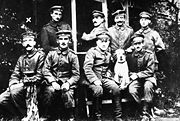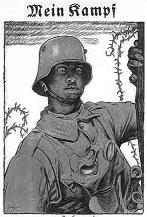Adolf Hitler
From Kaiserreich
Andromedos (Talk | contribs) |
Andromedos (Talk | contribs) (→'Mein Kampf: Adolf Hitler') |
||
| Line 37: | Line 37: | ||
Two years later, following the widespread popularity of the bestselling series produced by Propyläen, film director Wunderkind Leni Riefenstahl resolved to turn the material into a movie based on the accounts given. 'Unser Kampf', Our Struggle, boasted the highest production values hitherto seen. | Two years later, following the widespread popularity of the bestselling series produced by Propyläen, film director Wunderkind Leni Riefenstahl resolved to turn the material into a movie based on the accounts given. 'Unser Kampf', Our Struggle, boasted the highest production values hitherto seen. | ||
| - | Hitler (played by Eduard Heltir), features in scenes during both wars. He is depicted as | + | Hitler (played by Eduard Heltir), features in scenes during both wars. He is depicted as courageous, yet often distant from his comrades. |
| - | |||
| - | |||
[[Category:People]] [[Category: Authors]] [[Category:German-related topics]] | [[Category:People]] [[Category: Authors]] [[Category:German-related topics]] | ||
Revision as of 20:56, 22 October 2007
Adolf Hitler was an Austrian who served as a soldier in the Bavarian army during the Weltkrieg and the Intervention in Russia, during which he was killed in battle. His diary was used as the basis for the novel "Mein Kampf: Adolf Hitler", part of The Propyläen publishing house's series of books devoted to individual German soldiers' stories, accounts and poetry during these two conflicts.
Contents |
Early live
Childhood and heritage
Adolf Hitler was born in Braunau am Inn, Austria, the fourth child of six. His father, Alois Hitler, (1837–1903), was a customs official. His mother, Klara Pölzl, (1860–1907), was Alois' third wife. She was also his cousin, so a papal dispensation had to be obtained for the marriage. Of Alois and Klara's six children, only Adolf and his sister Paula reached adulthood. Hitler's father also had a son, Alois Jr, and a daughter, Angela, by his second wife.
After living some years in Vienna, working as an artist, Hitler moved to Munich in 1913. When the Weltkrieg began one year later, Hitler (who had refused to serve in the multi- ethic Austro- Hungarian army), petitioned King Ludwig III of Bavaria for permission to serve in a Bavarian regiment. This request was granted, and Adolf Hitler enlisted in the Bavarian army.
During the Weltkrieg
Hitler served in France and Belgium as a runner for the 16th Bavarian Reserve Regiment (called Regiment List after its first commander), which exposed him to enemy fire. He drew cartoons and instructional drawings for the army newspaper.
Hitler was twice decorated for bravery. He received the Iron Cross, Second Class, in 1914 and the Iron Cross, First Class, in 1918, an honour rarely given to a Gefreiter. However, because the regimental staff thought Hitler lacked leadership skills (or maybe because he was no German citizen), he was never promoted to Unteroffizier during the Weltkrieg. In 1916, Hitler was wounded in the leg but returned to the front in March 1917. He received the Wound Badge later that year. On October 15, 1918, Hitler was admitted to a field hospital, temporarily blinded by a mustard gas attack. Hitler later wrote in his diary it was during this experience that he became convinced the purpose of his life was to "save Germany." This diary, which would later become the basis for the famous novel and movie, contained not only the day-to day events of the war, but also Hitler's thoughts on politics, patriotism, Germany's future, poems and drawings.
Hitler was overjoyed when Germany finally efeated France, and happily joined the victory celebrations. These wonderful days are very well described in his diary.
Russian Intervention and death
For a few month, Hitler and his regiment were on garrison duty in Toul, France, until in 1920 they were transfered east to participate in the intervention. Hitler, finally promoted to Feldwebel, wrote alot about these days into his diary, describing the horros of battling the fanatic Bolshewiks. But he was also convinced that his personal struggle, and the struggle of all other soldiers combined, as a part of one great force, would lead the German people to it's destiny.
Hitler was killed during a mustard gas attack when, trapped in a partly destroyed dugout and with his gasmask damaged.
'Mein Kampf: Adolf Hitler'
After his death, Hitler's diary and other posessions was send to his sister Paula Hitler. The diary lay forgotten for over a decade until it was found in early 1936 by the late Hitler's half-niece, Geli Raubal. Having recently read an article about Propyläen publishing house's plans for it's new book series, she send them the diary. Propyläen's team of authors then turned it into the first volume of the 'Mein Kampf' series. The book, like the others of the 'Mein Kampf' series, sold very well, despite the economic crisis.
Two years later, following the widespread popularity of the bestselling series produced by Propyläen, film director Wunderkind Leni Riefenstahl resolved to turn the material into a movie based on the accounts given. 'Unser Kampf', Our Struggle, boasted the highest production values hitherto seen.
Hitler (played by Eduard Heltir), features in scenes during both wars. He is depicted as courageous, yet often distant from his comrades.


